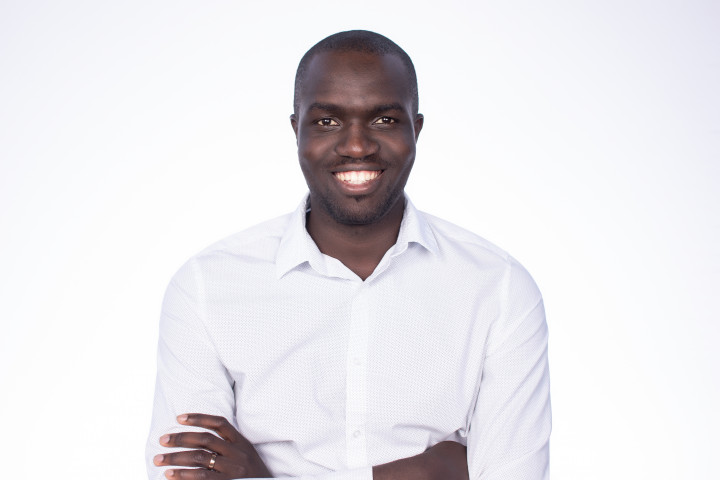The Discipline of Becoming an Expert
Born and raised in Kampala, Uganda, Moses Namara (B.S. ’16, computer science) came to Maryland to explore the field of computer science. Computers fascinated him since childhood and taking foundational computer science classes in high school further cemented his interest.
Through his education and research experiences, Namara says he has been a “huge” recipient of other people’s help—including professors, co-workers and friends.
“We live to help each other, to better each other in different ways. If different people hadn’t stood up to help me on my journey, I don’t think I would be here now,” he said. “People have poured into me, and I want to pour into others.”
Namara started his journey studying computer science at Montgomery College in fall 2012, transferring to the University of Maryland in 2014. He hit the ground running and took fall, winter, spring and summer courses.
“Through hackathons like Bitcamp and entrepreneurial labs like Startup Shell, I applied the things that I learned in the classroom,” he said. “UMD taught me how to be fearless and get out of my comfort zone—figuring out complex systems, exploring my interests and passions, and acquiring new skills to solve problems in an ever-changing world.”
With the goal of graduate school in mind, Namara reached out to Michelle Mazurek, an associate professor of computer science, and asked if she could use an undergraduate researcher on her team. She said yes, and through this research and his courses, Namara found his niche in privacy and cybersecurity.
When the team presented its paper on internet users’ thoughts on security encryption at the 2016 Symposium on Usable Privacy and Security Conference, Namara met privacy scholar Bart Knijnenburg. Knijnenburg suggested that Namara apply to Clemson University for graduate school—and would eventually become his advisor.
Now a Ph.D. candidate researching human-centered computing at Clemson, Namara is further developing his expertise in internet privacy. As he built on his privacy research, his focus closely aligned with the artificial intelligence field, examining automated decision-making and data collection.
“I’m investigating how we can make it easier for users to make privacy decisions online,” Namara said. “How do we ensure that whenever you’re online, for example, using a platform like Facebook, you’re able to control who gets to see your messages and posts?”
When he began his doctoral studies, Namara received a Facebook Fellowship, which provided him with funding for tuition and attending computing conferences. Through the fellowship, he met Rediet Abebe, another Facebook Fellow who shared his passion for increasing the presence of Black people in the artificial intelligence field. Together, they went on to create the Black in AI Academic Program in 2018.
“A majority of the consequences of artificial intelligence systems gradually fall on underrepresented communities or minorities—they end up being jailed or misidentified or not getting loans,” Namara said. “We need students of color in the field to make a difference and make the corrections that are needed.”
The Black in AI Academic Program is a nonprofit network that aims to address these issues by bringing Black researchers together and providing them with professional development opportunities and resources. The program has mentored 400 undergraduates to date, 200 of whom have been accepted to competitive graduate programs to study artificial intelligence.
Namara is committed to scaling opportunities for students interested in computer science, exposing them to the field while encouraging them to pursue higher education and become industry experts. Namara knows firsthand the value of networking at conferences. That’s why he prioritizes making conferences more accessible to students of color interested in tech.
Now, three years after co-founding the Black in AI Academic Program, Namara was named one of MIT Technology Review's 35 Innovators Under 35. Each year, more than 500 people are nominated for the honor, and previous lists included tech giants such as Sergey Brin (B.S. '93, computer science and mathematics) and Mark Zuckerberg.
“Having that external validation and having that mark saying you’re one of the best innovators in the world really is such an honor,” Namara said. “Seeing how my academic journey has come together—the sleepless nights and the tough moments when I wanted to give up—has really reinforced my belief in myself.”
Namara plans to defend his dissertation in spring 2022, with the goal of eventually being a professor at a university. Helping others is “truly the essence of life,” according to Namara, and he plans to dedicate his career to paying it forward.
“I want to be the kind of teacher who deeply cares about his students, especially students who might not have similar backgrounds as me, who might come from different communities, troubled communities,” Namara said. “I just want to help people, really.”
Written by Katie Bemb
The Department welcomes comments, suggestions and corrections. Send email to editor [-at-] cs [dot] umd [dot] edu.
